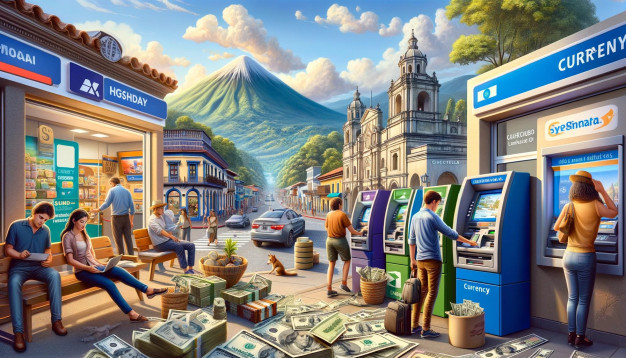Currency in Guatemala
Navigate Guatemalan currency with ease: tips on ATMs, exchanges, and payment options.

Currency Overview in Guatemala
Official Currency
The legal tender in Guatemala is the Quetzal (GTQ), named after the national bird. Denominations come in colorful notes and handy coins, including the rare sighting of the half quetzal coin, which can feel like spotting the bird itself.
Acceptance of Foreign Currencies
U.S. dollars are widely accepted, especially in tourist areas, but expect change in quetzals. Other currencies might be given the cold shoulder, so stick to the local or American bills.
Understanding Exchange Rates
Exchange rates can bounce around like a marimba player on a sugar rush. Always check the current rates and do quick math to avoid being shortchanged.
Using Cash in Guatemala
Cash as the Primary Method
Cash is king in Guatemala, and cards are often greeted with a "no, gracias". Always keep some quetzals on hand for small purchases and local vendors.
Tipping Practices
Tipping isn’t a historical Mayan tradition, but 10% is appreciated at restaurants. Round up for taxi drivers and toss a few quetzals to helpful bellboys.
Bargaining in Local Markets
Haggling in markets is expected; it’s like a dance, and you’re expected to step in. Start at 50% of the asking price and meet somewhere in the middle, with a smile.
ATMs in Guatemala
Finding ATMs
ATMs (cajeros automáticos) are not as common as jade stores, but can be found in cities and tourist spots. Look for banks or shout "ATM!" three times, and one will appear.
Fees and Withdrawal Limits
Bank ATMs may charge you an arm, not a leg, for withdrawals, typically around GTQ 20-30. Limits vary, but expect around GTQ 2,000 per day.
Safety Tips
Use ATMs in daylight, in banks, or guarded areas. Watch out for shoulder surfers and skimmers, lest your card starts funding someone’s tamale business.
Paying with Cards
Credit Card Acceptance
Credit cards are accepted at fancier establishments and hotels but brace for service charges up to 7%. Visa and MasterCard reign supreme; AmEx is the distant cousin.
Debit Card Use
Debit cards can pay for services but beware of double charges and blocks. Always have backup cash for those "sorry, no signal" moments.
Transaction Fees
Banks may charge international fees for card usage. Brace yourself for the statement, or get a travel-friendly card that cuts the fees.
Money Exchange
Currency Exchange Services
Banks and authorized exchange offices (casas de cambio) are the go-to for swapping your cash. Avoid street dealers who may peddle rates too good to be true.
Best Places to Exchange Money
Banks and airport exchanges give you security but not necessarily the best rates. Shop around, and remember: patience saves pesos, or in this case, quetzals.
Official vs. Black Market Rates
The black market might whisper sweet nothings of better rates, but the risks outweigh the gains. Keep it legal to avoid contributing to the local crime statistics.
Travelers’ Checks
Usage and Acceptance
Travelers’ checks are as rare as the quetzal bird itself. If you find a place that accepts them, consider it a small miracle.
Pros and Cons
Security is a plus, but inconvenience is the hefty price tag. Banks may exchange them, but expect a marathon of paperwork and the pace of a sloth.
Budgeting Tips
Average Costs
A modest budget can go far in Guatemala. Street food costs mere quetzals, while a bed in a hostel could be 100 GTQ or less.
Saving Money on Currency Exchange
Withdraw larger amounts less frequently to save on fees, and avoid airport exchanges that feast on your wallet like a tapeworm.
Tax and Refunds
Value Added Tax (VAT)
A 12% VAT is slapped on most purchases. It’s as unavoidable as the rainy season in Petén.
Tourist Refund Schemes
Tourist refund schemes are as common as flying pigs. Don’t count on it, and consider VAT part of the local charm.
Emergency Situations
Lost/Stolen Wallet or Cards
In the event of a lost or stolen wallet or cards, report immediately to cancel cards. Keep photocopies of important documents in your suitcase’s secret compartment.
Accessing Money in an Emergency
Embassies and Western Union can be your financial superheroes, but let’s hope your money management skills mean you’ll never have to send out the Bat-Signal.
Currency Etiquette
Counting Money in Public
Counting your money in public is like announcing "rob me, I’m a tourist!" Do your math discreetly or in the safety of your accommodation.
Discussing Prices
Discuss prices with a smile, a "por favor," and a touch of Spanish. It’s a respectful tango that could save you a few quetzals.
Conclusion
Remember, in Guatemala, cash is the melody, cards are the backup singers, and bargaining is the dance. Keep your wits, quetzals, and humor at hand, and your financial adventures in the Land of Eternal Spring will be as smooth as a lake at dawn.